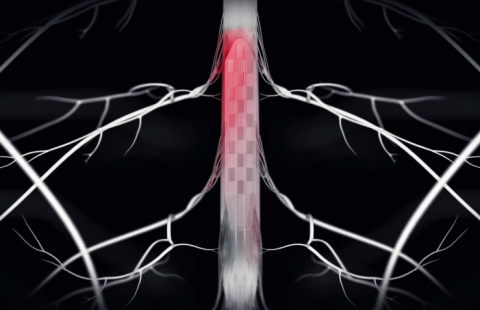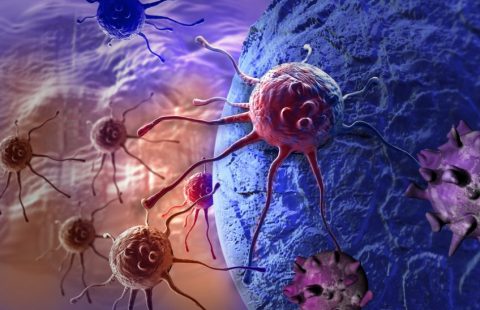Teams from the Paris Public Hospitals (AP-HP), Pierre and Marie Curie University, Inserm and the CarThera company (which is hosted by the Brain and Spine Institute [ICM]), coordinated by Prof. Alexandre Carpentier, a neurosurgeon at Pitié-Salpêtrière Hospital, AP-HP, have successfully used ultrasound to temporarily permeabilise blood vessels in the brains of patients affected by recurrent malignant brain tumours. This innovative method allows increased delivery of treatments, including chemotherapeutic agents, to the brain, and represents hope for other brain pathologies. This work was published on 15 June in the international journal Science Translational Medicine.
Treatment of primary malignant brain tumours is currently based on a neurosurgical procedure followed by sessions of chemotherapy and/or radiotherapy. These treatments bring about disease remission for varying periods, depending on the patient. The blood-brain barrier (BBB), this particularly impermeable wall of vessels that limits the exposure of the neurons to toxic agents, restricts the entry and hence the delivery of treatments to the brain.
Given this observation, the respective teams led by Prof. Alexandre Carpentier and Dr Ahmed Idbaih, and the neuro-oncology group from Pitié-Salpêtrière Hospital, AP-HP, launched a phase 1/2a clinical trial in July 2014, sponsored by AP-HP, in patients with recurrent malignant brain tumours.
The objective is to permeabilise the blood-brain barrier, in order to increase the penetration and delivery of chemotherapeutic drugs to the brain, using the “SonoCloud®” ultrasound device developed by the CarThera company.
Implanted in the thickness of the skull bone, this device is activated a few minutes before intravenous injection of the product. Two minutes of sonication is enough to temporarily permeabilise the BBB for 6 hours, thereby allowing a 5-fold greater delivery of the drug to the brain than would normally happen.To date, and for the first time in the world, several repeated “openings” of the BBB could be observed in the 20 patients treated. Moreover, tolerance is excellent: the technology invented by Prof. Carpentier and developed by the CarThera company, with the help of the Inserm LabTAU physics laboratory, does not damage the neurons, and the BBB spontaneously closes again 6 hours after the intravenous infusion.
According to Prof. Alexandre Carpentier, “this innovative method offers hope for the
treatment of brain cancers, as well as other brain pathologies, such as, potentially, Alzheimer’s disease, where the existing drugs have difficulty in penetrating the brain. This technique must continue to undergo evaluation to allow its entry into routine clinical use in a few years.”
These contents could be interesting :
1Assistance Publique–Hôpitaux de Paris (AP-HP), Hôpitaux Universitaires La Pitié-Salpêtrière, Service de Neurochirurgie, F-75013 Paris, France.
2Sorbonne Universités, UPMC Univ Paris 06, UMR S 1127, F-75013 Paris, France.
3CarThera, Institut du Cerveau et de laMoelle épinière (ICM), Paris F-75013, France.
4AP-HP, Hôpitaux Universitaires La Pitié-Salpêtrière–Charles Foix, Service de Neuroradiologie, F-75013 Paris, France.
5INSERM, U1032, LabTau, Lyon F-69003, France.
6INSERM, U 1127, F-75013 Paris, France.
7CNRS, UMR 7225, F-75013, Paris, France.
8ICM, F-75013 Paris, France.
9AP-HP, Hôpitaux Universitaires La Pitié-Salpêtrière–Charles Foix, Service de Neurologie 2-Mazarin, F-75013 Paris, France. Science Translational Medicine

